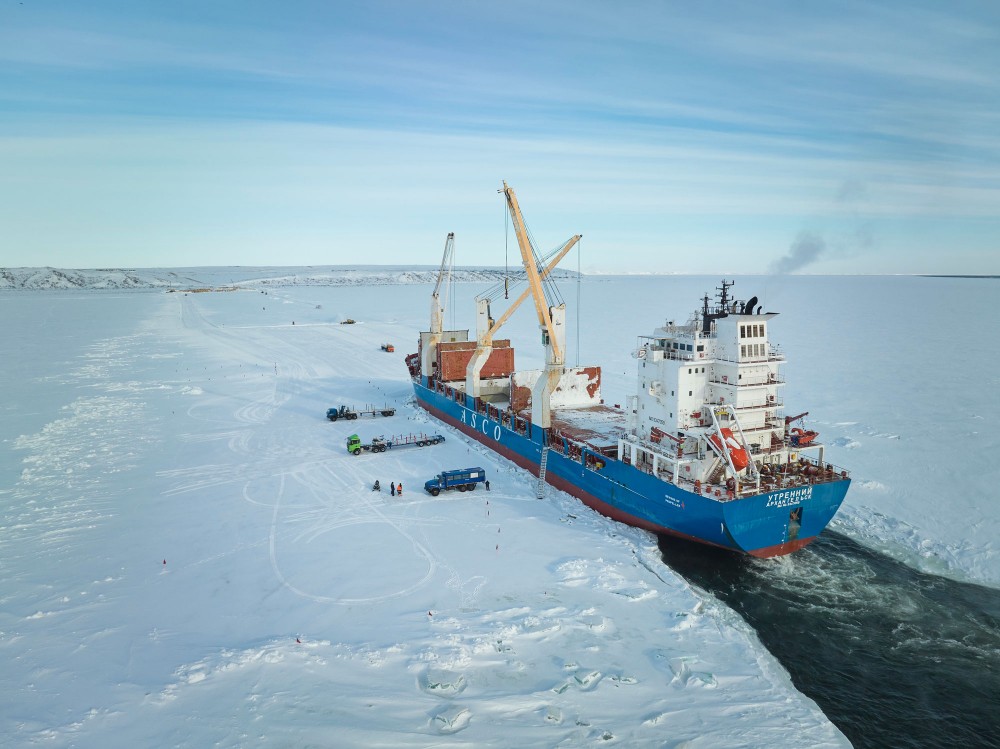On remotest Arctic coast lies 21 km of oil pipes stacked ready for Russia’s new monster project
War and sanctions notwithstanding, Russian state oilmen proceed with the development of the Vostok Oil project. It is to produce more than 100 million tons of oil per year and will be paramount for Putin to reach his much-desired ambitions for Arctic shipping.

The Russian president wants the Northern Sea Route to become a competitive global trade corridor and has commissioned his men in government to do what it takes.
This week, loyal government officials again confirmed to the state leader that everything is proceeding according to plans and that the Northern Sea Route will soon see an unprecedented boost in shipping.
In an online meeting with Putin and top officials, Minister of the Far East and Arctic Aleksei Chekunkov said that infrastructure along the Arctic route is built for shipping to reach 100 million tons of goods in year 2026 and 200 million tons in 2030.

Already in 2024, shipping on the route will exceed 70 million tons, he assured the president. It is all outlined in a federal development plan for the route covering the period until 2035, he explained.
Vladimir Putin might be happy with the affirmative words by Minister Chekunkov. However, ever since the start of Russia’s full-scale war against Ukraine and the subsequent massive international sanctions against Moscow there have been growing doubts about Russia’s actual ability to develop its large Arctic projects.
Novatek, and its new natural gas project Arctic LNG 2, have experienced serious troubles with replacing technology that originally was to be provided by European and U.S manufacturers, and the projected construction of Arctic-class tankers and carriers has been hampered by cancelled Western contracts.
Likewise, the export market for many of the projects has vanished.
The sanctions and growing economic troubles notwithstanding, Arctic Minister Chekunkov appears confident about the situation.
The new industrial projects now developed by companies Rosneft, Gazprom Neft, Novatek, Nornickel, Severnaya Zvezda and Baymskaya will alone provide 190 million tons of goods traffic on the Northern Sea Route, he told Putin.
And it is Rosneft’s Vostok Oil project that is the by far biggest of the Russian Arctic adventures. When fully developed, the far northern oil project will have an annual output of more than 100 million per year.
All of it is to be transported by a new network of pipelines built across the tundra of the Taymyr Peninsula and to the project terminal of Sever Bay on coast of the Kara Sea.
Since project development started in 2022, ships loaded with construction materials have been shuttling to the Yenisey River. According to Rosneft, a total of 71 shipments have been made since the start of 2023 and 570,000 tons of various construction materials brought to project development sites.
Photos shared by Rosneft subsidiary Vankorneft show a major number of oil pipes stacked in the area ready to be assembled as part of the new pipelines.
Visual estimates indicate that the pipes have a total length of at least 21 kilometres. It is only be minor share of the total number of pipes needed. According to Rosneft leader Igor Sechin, the Vostok Oil will include the building of as much as 800 km of pipelines. That includes a 7 km long pipeline under the Yenisey river.
The state-owned Russian oil company is now hectically lobbying the project to potential partners in India and China. And Vostok Oil can easily be developed without western tech, the company argues.
According to Vladimir Chernov, the Vostok Oil General Director, as much as 98 percent of all the project’s materials and equipment will be produced domestically in Russia.
Located in Kirkenes, Norway, just a few kilometres from the borders to Russia and Finland, the Barents Observer is dedicated to cross-border journalism in Scandinavia, Russia and the wider Arctic. As a non-profit stock company that is fully owned by its reporters, its editorial decisions are free of regional, national or private-sector influence. It has been a partner to ABJ and its predecessors since 2016.


